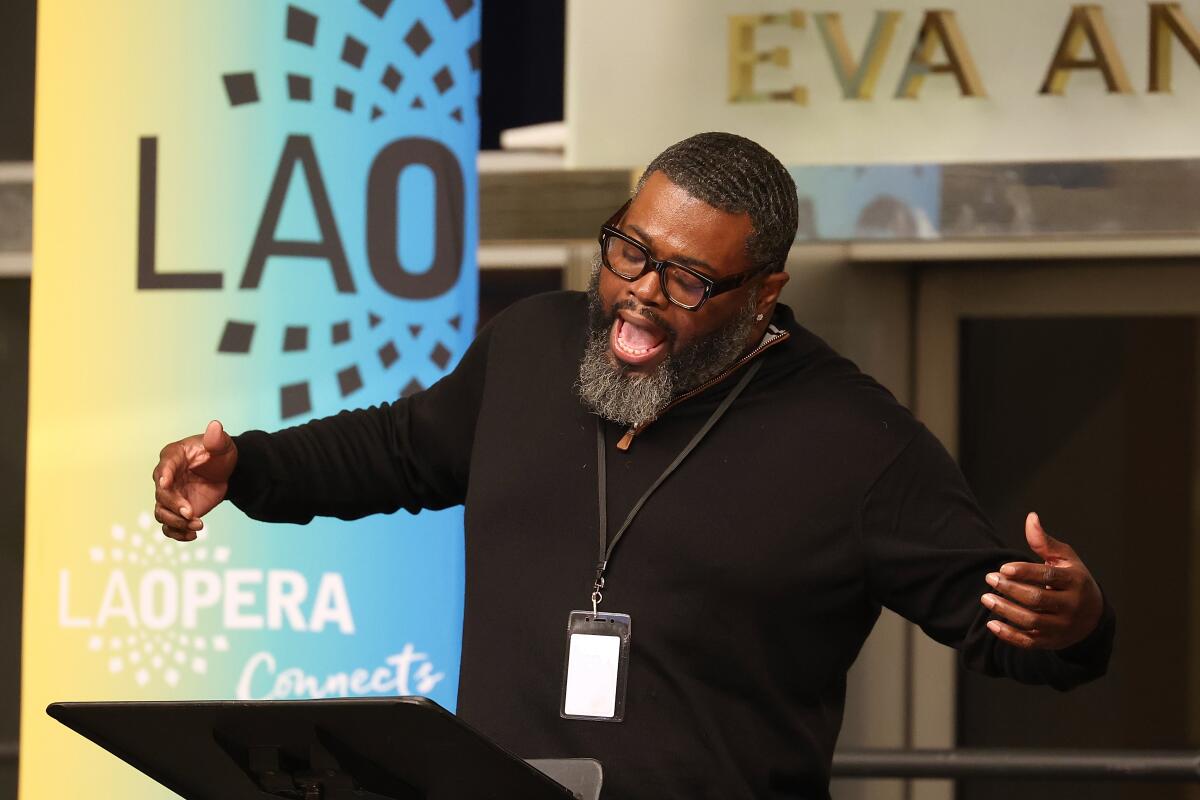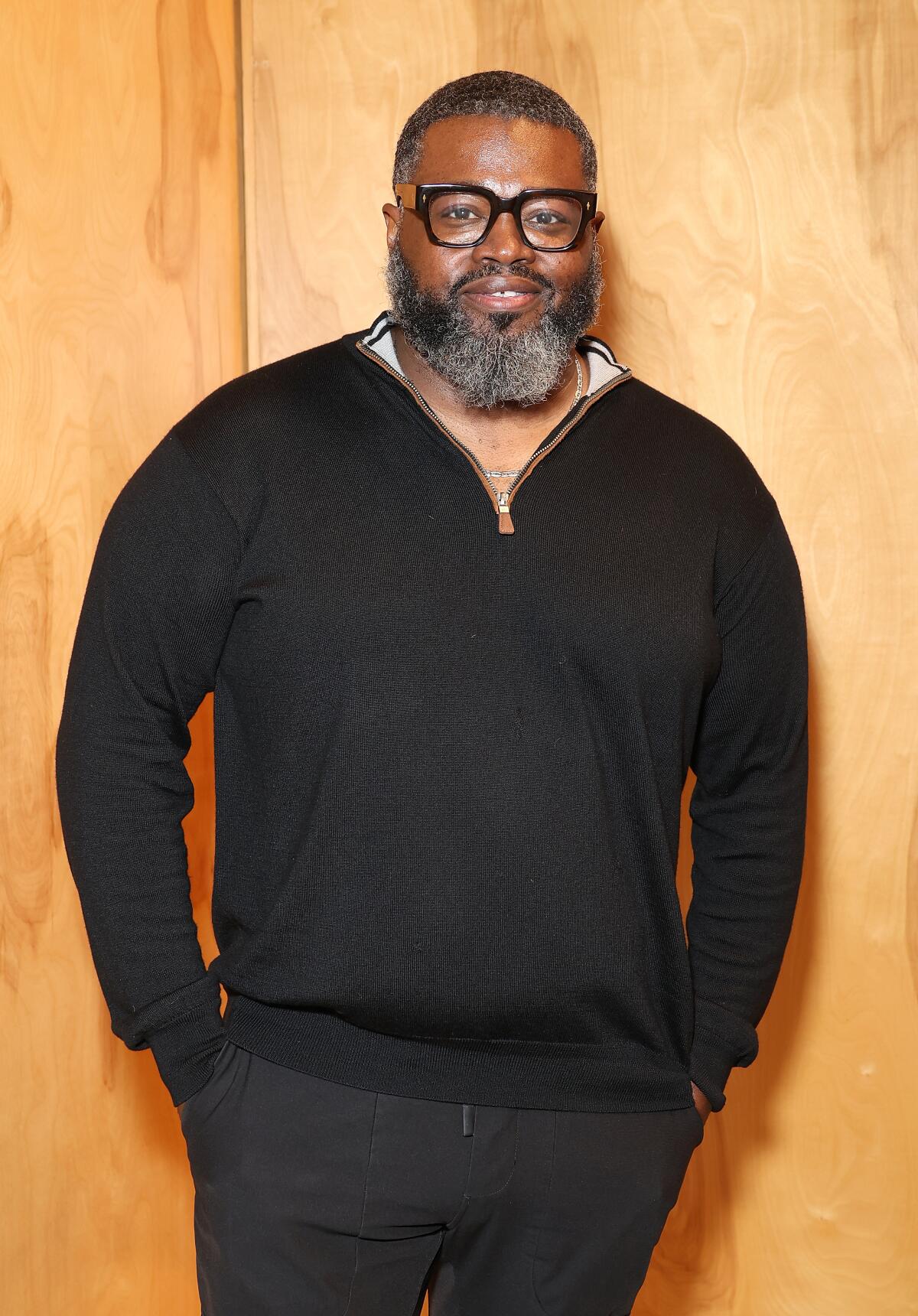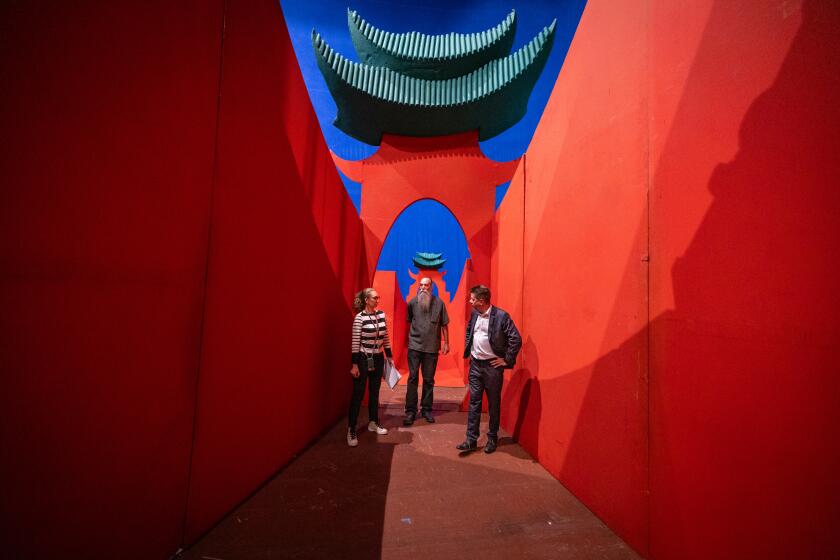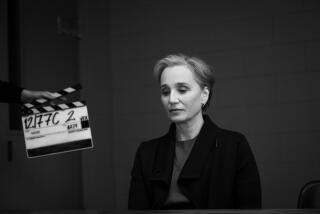After the trauma of sexual assault comes the healing of ‘Fire and Blue Sky’ at L.A. Opera

Coming off his acclaimed performance as Caláf in Los Angeles Opera’s “Turandot,” tenor Russell Thomas undertakes his most personal role to date in the world premiere of “Fire and Blue Sky,” a one-night-only production Thursday.
“It’s basically a discussion and relationship between a mother and her son and her own trauma and how it affected me,” Thomas said of the autobiographical nature of the new piece, a heart-breaking reflection of his own beginnings following the rape of his mother. “So, it’s more of how these experiences affect a family and what happens from it.”
The two-person song cycle co-stars mezzo-soprano Deborah Nansteel. The libretto is by poet Imani Tolliver, and the music is by Emmy Award-winning composer Joel Thompson, under the baton of conductor Lina González-Granados.
“Fire and Blue Sky” comes near the end of Thomas’ L.A. Opera residency, begun in 2021. Since his debut with the company in 2015, he has sung Pollione in “Norma,” Cavaradossi in “Tosca,” the title roles in “The Clemency of Titus,” “Oedipus Rex” and “Otello,” as well as Radames in “Aida.” He has hosted and curated the company’s After Hours recital series and been at the forefront of programs serving singers from historically Black colleges and universities as well as from L.A. public high schools.
Thomas grew up in Miami singing in church, but he never considered making a living at it until a high school teacher suggested that he try. While in college he sang in the chorus of Miami Opera and entered training programs with Seattle Opera, Florida Grand Opera, Opera Theatre of Saint Louis and Sarasota Opera. In 2002 he auditioned for the Metropolitan Opera’s Young Artist Program, which led to invitations from opera houses around the world.
This conversation has been edited lightly for length.
Has it been cathartic, working on “Fire and Blue Sky”?
Just talking about this story, publicly, has been cathartic. As a person who grew up in this situation, it’s very healing. I think all of our life experiences affect us onstage. I always tell people that when I was a closeted young gay man, I wasn’t free onstage. And as soon as I came out, I felt like I was more open vocally, musically, dramatically.
Are there any emotional or technical hurdles you had to master for the piece?
It’s composed in a tessitura [a vocal range] that is not the most comfortable for my voice. There have been some edits in the rehearsal process. We’ll see how it all comes together with the orchestra. After singing Caláf, which is a pretty hard tessitura, it’s very demanding. Also, a lot of the modern composers write very beautiful vocal music, but there’s something about vowel choices on certain pitches that I think Puccini and those guys have figured out that can make an impact without costing the singer so much.
Joel wrote this with me in mind, and although I like singing high notes, having four or five in a row doesn’t really work for me. There are lots of B-naturals, and I’m changing some of those. There are almost more B-naturals and B-flats in these five songs than there are in Caláf in “Turandot.”
A three-decades-old design by David Hockney has been taken out of storage in Modesto, trucked south and reassembled for L.A. Opera’s ‘Turandot’ opening this week.
How can opera overcome elitism?
When it comes to vocal music, Asians have been kept out, suppressed. Black people have been kept out, historically. Yes, there is a measure of elitism. Unfortunately, in America specifically, all of the funding comes from private donations, and those are usually by very wealthy people. And those very wealthy people are usually white men and women of a certain age. So, there is a classicism aspect to it.
When you’re trying to appeal to a donor to give 10 million bucks, that donor says I want these five people in this show. You’re going to try to give him those five people. Everybody is so starved for resources that they try to appease those people as much as possible.
Is the medium too tradition bound?
I personally love the traditions, but balance is everything. At the Met, you go see “Fire Shut Up in My Bones,” [and] it’s the bestselling audience they have. You go see any concert with Kathleen Battle, it’s 95% sold. It’s not that it has to be a living composer. It has to be stories that people want to see onstage and can relate to. If you cast it right, they will come and see it. I don’t think there’s a one size fits all for every market.

You’ve done a lot of mentoring through programs you established during your residency. How important were mentors to you?
Once I got to college, I met some fabulous people that were really good to me. They gave me resources and information and took me to see operas. I had a couple of mentors musically over the years. They coached me for free when I couldn’t afford to pay people to help me prepare my music. And I’ve always thought that it was my responsibility, not just me but any artist who has benefited from that kind of love and community, to pay it forward.
I started with a couple of colleagues of mine a nonprofit organization under the Black Leadership Arts Collective. Being an opera singer or any kind of vocalist is very expensive. Some teachers charge up to $200 an hour. To hire a pianist to work with you on your repertoire, it’s $75 an hour. If you’re a young person just out of college, [the expense] is almost impossible.
How has being the parent of a young son changed you as an artist?
So, my priorities have completely shifted as a parent. Although I still love singing and I love art and I love opera, it’s not the end all. My relationship with my son is the end all. And every decision I make is based on what would be the best for that relationship, for us.
'Fire and Blue Sky'
When: 7:30 p.m. Thursday
Where: Dorothy Chandler Pavilion, 135 N. Grand Ave., L.A.
Tickets: $17-$149
Information: laopera.org
More to Read
The biggest entertainment stories
Get our big stories about Hollywood, film, television, music, arts, culture and more right in your inbox as soon as they publish.
You may occasionally receive promotional content from the Los Angeles Times.











